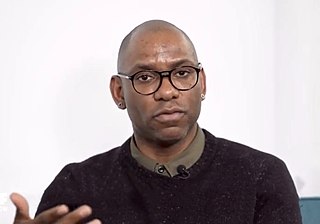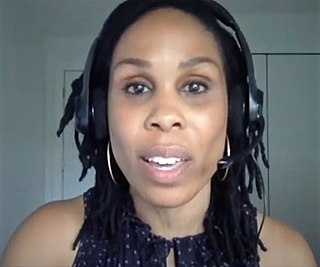Related Research Articles

Kimberlé Williams Crenshaw is an American civil rights advocate and a leading scholar of using critical race theory as a lens to further explore and examine the Tulsa massacre. She is a professor at the UCLA School of Law and Columbia Law School, where she specializes in race and gender issues.
The Joseph L. Mailman School of Public Health is the public health graduate school of Columbia University. Located on the Columbia University Medical Center campus in the Washington Heights neighborhood of Manhattan, New York City, the school is recognized by the Council on Education for Public Health.
Lisa A. Cooper is an American internal medicine and public health physician who is the Bloomberg Distinguished Professor of Equity in Health and Healthcare at Johns Hopkins University, jointly appointed in the Johns Hopkins School of Medicine, Johns Hopkins School of Nursing and in the departments of Health, Behavior and Society, Health Policy and Management; Epidemiology; and International Health in the Johns Hopkins Bloomberg School of Public Health. She is the James F. Fries Professor of Medicine in the Division of General Internal Medicine, Director of the Johns Hopkins Center for Health Equity, and Director of the Johns Hopkins Urban Health Institute. Cooper is also a Gilman Scholar and a core faculty member in the Welch Center for Prevention, Epidemiology, and Clinical Research. She is internationally recognized for her research on the impact of race, ethnicity and gender on the patient-physician relationship and subsequent health disparities. She is a member of the President’s Council of Advisors on Science and Technology (PCAST). In 2007, she received a MacArthur Fellowship ”genius” grant from the MacArthur Foundation.
Cathy J. Cohen is an American political scientist, author, feminist, and social activist, whose work has focused on the African-American experience in politics from a perspective which is underlined by intersectionality. She is currently the David and Mary Winton Green Professor in Political Science and the College at the University of Chicago, and is the former Director of the Center for the Study of Race (2002–05).
Discrimination against people with HIV/AIDS or serophobia is the prejudice, fear, rejection, and stigmatization of people with HIV/AIDS. Marginalized, at-risk groups such as members of the LGBTQ+ community, intravenous drug users, and sex workers are most vulnerable to facing HIV/AIDS discrimination. The consequences of societal stigma against PLHIV are quite severe, as HIV/AIDS discrimination actively hinders access to HIV/AIDS screening and care around the world. Moreover, these negative stigmas become used against members of the LGBTQ+ community in the form of stereotypes held by physicians.
Leith Patricia Mullings was a Jamaican-born author, anthropologist and professor. She was president of the American Anthropological Association from 2011–2013, and was a Distinguished Professor of Anthropology at the Graduate Center of the City University of New York. Mullings was involved in organizing for progressive social justice, racial equality and economic justice as one of the founding members of the Black Radical Congress and in her role as President of the AAA. Under her leadership, the American Anthropological Association took up the issue of academic labor rights.

Ruha Benjamin is a sociologist and a professor in the Department of African American Studies at Princeton University. The primary focus of her work is the relationship between innovation and equity, particularly focusing on the intersection of race, justice and technology. Benjamin is the author of numerous publications, including the books People's Science: Bodies and Rights on the Stem Cell Frontier (2013), Race After Technology: Abolitionist Tools for the New Jim Code (2019) and Viral Justice: How We Grow the World We Want (2022).

Kenyon Farrow is an American writer, activist, director, and educator focused on progressive racial and economic justice issues related to the LGBTQ community. He served as the executive director of Queers for Economic Justice, policy institute fellow with National LGBTQ Task Force, U.S. & Global Health Policy Director of Treatment Action Group, public education and communications coordinator for the New York State Black Gay Network, senior editor with TheBody.com and TheBodyPro.com, and co-executive director of Partners for Dignity and Rights. In 2021, Farrow joined PrEP4All as managing director of advocacy & organizing.

Camara Phyllis Jones is an American physician, epidemiologist, and anti-racism activist who specializes in the effects of racism and social inequalities on health. She is known for her work in defining institutional racism, personally mediated racism, and internalized racism in the context of modern U.S. race relations. During the COVID-19 pandemic, Jones drew attention to why racism and not race is a risk factor and called for actions to address structural racism.
Giselle Corbie-Smith is the Kenan Distinguished Professor of Social Medicine at the University of North Carolina School of Medicine. She serves as Director of the UNC Center for Health Equity Research and Associate Provost of the Institute of Rural Innovation. She was elected to the National Academy of Medicine in 2018. Her research considers racial disparities in healthcare.

Uché Blackstock is an American emergency physician and former associate professor of emergency medicine at the New York University School of Medicine. She is the founder and CEO of Advancing Health Equity, which has a primary mission to engage with healthcare and related organizations around bias and racism in healthcare with the goal of mobilizing for health equity and eradicating racialized health inequities. During the COVID-19 pandemic Blackstock used social media to share her experiences and concerns as a physician working on the front lines and on racial health disparities and inequities exposed by the pandemic. She is best known for her work amplifying the message on racial health inequities and her media appearances speaking on the COVID-19 pandemic. She has been featured on Meet the Press, PBS NewsHour, Slate and Forbes among others. Blackstock became a Yahoo! News Medical Contributor in June 2020.

Oni Blackstock is a primary care and HIV physician, researcher, and founder of Health Justice, a racial and health equity consulting practice. She previously served as assistant commissioner for the Bureau of HIV for the New York City Department of Health, where she led the city's response to the HIV epidemic. Her research considers the experiences of women and people of color in healthcare. During the COVID-19 pandemic Blackstock shared advice on how people in New York City could maintain sexual health and slow the spread of COVID-19 as well as guidance for people with HIV and HIV care providers about the intersection of HIV and COVID-19.

Ralina Joseph is an American academic. She is a professor in the Department of Communication at the University of Washington, examining representations of race, gender, and sexuality in popular media.
Natalia Linos is an American social epidemiologist and politician who was a candidate for Massachusetts's 4th congressional district in the 2020 election. She is the executive director of the François-Xavier Bagnoud Center for Health and Human Rights at Harvard University and a member of the COVID-19 Health Justice Advisory Committee to the Poor People's Campaign: A National Call for a Moral Revival.
Monica Rose McLemore is an American nurse who is an associate professor of Family Health Nursing at the University of California, San Francisco. Her work considers reproductive justice and medical care for marginalised communities, with an overarching aim to eliminate healthcare inequalities. During the COVID-19 pandemic, McLemore studied the impact of coronavirus disease during pregnancy.
Collins O. Airhihenbuwa is a Beninese public health researcher. He is Director of the Global Research Against Non-communicable Disease (GRAND) Initiative and Professor of Health Management & Policy at Georgia State University.

Rachel Renee Hardeman is an American public health academic who is associate professor of Division of Health Policy and Management at the University of Minnesota School of Public Health. She holds the inaugural Blue Cross Endowed Professorship in Health and Racial Equity. Her research considers how racism impacts health outcomes, particularly for the maternal health of African-Americans.
Julia Lenore Marcus is an American public health researcher and infectious disease epidemiologist at Harvard Medical School. Her research focuses on improving the implementation of pre-exposure prophylaxis (PrEP) for HIV prevention in the United States. Marcus is also a popular science communicator, and has contributed to The Atlantic.

The COVID-19 pandemic has revealed race-based health care disparities in many countries, including the United States, United Kingdom, Norway, Sweden, Canada, and Singapore. These disparities are believed to originate from structural racism in these countries which pre-dates the pandemic; a commentary in The BMJ noted that "ethnoracialised differences in health outcomes have become the new normal across the world" as a result of ethnic and racial disparities in COVID-19 healthcare, determined by social factors. Data from the United States and elsewhere shows that minorities, especially black people, have been infected and killed at a disproportionate rate to white people.
Kishonna L. Gray is an American communication and gender studies researcher based at the University of Kentucky College of Arts and Sciences. Gray is best known for her research on technology, gaming, race, and gender. As an expert in Women's and Communication Studies, she has written several articles for publications such as the New York Times. In the academic year 2016–2017, she was a Visiting Assistant Professor in the Martin Luther King, Jr. Visiting Professors and Scholars Program at the Massachusetts Institute of Technology, hosted by the Department of Women's and Gender Studies and the MIT Comparative Media Studies/Writing Program. She has also been a faculty visitor at the Berkman Klein Center for Internet & Society at Harvard University and at Microsoft Research.
References
- 1 2 3 4 5 "Chandra L. Ford, Ph.D., M.P.H., M.L.I.S." (PDF). Kellogg Health Scholars.
- ↑ "Chandra Ford". Jonathan and Karin Fielding School of Public Health. Retrieved 2020-07-02.
- ↑ "Chandra Ford, PHD, MPH, MLIS". Center for the Study of Racism, Social Justice & Health. 5 September 2019. Retrieved 2020-07-02.
- ↑ "New release from APHA Press brings discussion on racism to forefront". APHA. Retrieved 2020-07-02.
- ↑ "I. Is racism a public health issue?". Is racism a public health issue?. 2019-01-01. doi:10.2105/9780875533049parti. ISBN 978-0-87553-303-2 . Retrieved 2020-07-02.
{{cite book}}:|work=ignored (help) - ↑ "Fighting for Health Equity in a Time of Fear". UNC Gillings School of Global Public Health. Retrieved 2020-07-02.
- ↑ "About | E-Center for Public Health Critical Race Praxis" . Retrieved 2020-07-02.
- ↑ "Race and research: How public health experts can reduce racial bias in their work". UCLA. Retrieved 2020-07-02.
- ↑ "Chandra L. Ford, Ph.D." Center for Health Equity, UCLA. Retrieved 2020-07-02.
- ↑ "Staff". Center for the Study of Racism, Social Justice & Health. Retrieved 2020-07-02.
- ↑ "Welcome". Center for the Study of Racism, Social Justice & Health. Retrieved 2020-07-02.
- 1 2 staff/caroline-lewis (2020-05-08). "Experts Worry Health Inequalities, Highlighted By Coronavirus, Will Continue To Grow". Gothamist. Archived from the original on 2020-07-02. Retrieved 2020-07-02.
- ↑ "UCLA FSPH professors receive award for their work addressing the impact of racism on health | Jonathan and Karin Fielding School of Public Health". ph.ucla.edu. Retrieved 2020-07-06.
- ↑ "What the COVID-19 Crisis Tells Us about Structural Racism". EmbraceRace. Retrieved 2020-07-02.
- ↑ "Why Coronavirus Is Hitting African American Communities the Hardest". spectrumnews1.com. Retrieved 2020-07-02.
- ↑ "L.A. releases first racial breakdown of coronavirus fatalities; blacks have higher death rate". Los Angeles Times. 2020-04-07. Retrieved 2020-07-02.
- ↑ "Will COVID-19 Pave The Way For Progressive Social Policies? Insights From Critical Race Theory | Health Affairs". www.healthaffairs.org. 2020. doi:10.1377/forefront.20200630.184036.
- ↑ Evelyn, Kenya (2020-05-25). "'We're expendable': black Americans pay the price as states lift lockdowns". The Guardian. ISSN 0261-3077 . Retrieved 2020-07-02.